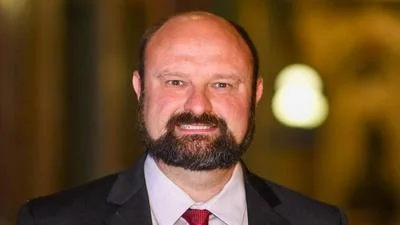Jennifer Korte | Provided
Jennifer Korte | Provided
The SAFE-T Act, set to go into effect on Jan. 1, has been subject to criticism from state’s attorneys to candidates campaigning for election.
The provision in the bill that abolishes cash bail has been the key recurring talking point for both sides. In lieu of cash bail is a system where the "burden of proof" for pretrial detention falls to the state. Gov. J.B. Pritzker has said the bill as a whole will bring equitable change to Illinois’ justice system. The opposition has been adamant that the SAFE-T Act will not make citizens more safe, but simply overburden police departments, and provide the opportunity for violent criminals to be released back onto the streets.
“One of the problems with the SAFE-T Act seldom discussed is the voluminous paperwork the new law requires," Jennifer Korte, candidate for state representative in the 112th district, told the Metro East Sun. "Set to take effect in 2023, this law will require police officers to complete an estimated six to eight additional hours of paperwork for each arrest they make. This means police officers will be spending fewer hours on the street which will inevitably make our communities less safe. I am the only candidate in this race calling for the repeal of the SAFE-T Act because I am the only candidate who understands how dangerous this law is for our communities. We need to support law enforcement and we must repeal the SAFE-T Act immediately.”
The Illinois Courts website states that the "Illinois Supreme Court Pretrial Implementation Task Force was created in 2020 to prioritize and implement the recommendations of the Supreme Court Commission on Pretrial Practices and help prepare the justice system for the changes coming once the Pretrial Fairness Act (PFA) takes effect in 2023." The PFA was a part of Public Act 101-0652; originally HB3653, the SAFE-T Act.
In a Chicago Sun Times op-ed article, former Riverside police chief Tom Weitzel explained what this means for police departments across the state. Weitzel discussed the administrative burden the average police officer is facing following the action of the Pretrial Implementation Task Force.
According to Weitzel, police officers on a felony arrest will likely start choosing to not make that arrest. The reasoning behind this is because with the elimination of cash bail and "burden of proof" for pretrial detention falling to the state, it is possible the individual committing a felony will be released back onto the street while the officer must complete potentially 6-8 hours of paperwork for that one arrest.
Weitzel believes that the implementation of the SAFE-T Act will create "apathy and low morale" in police officers across the state. He concluded the op-ed by expressing that he is not advocating for this behavior nor is he claiming it is right, but in his opinion this is what will happen should the SAFE-T Act go into effect on Jan. 1.
The Center Square reported that on a recent campaign stop, Pritzker said if "making changes to the language" helps people to understand the bill and keeps the state safe, he would be open to it.
Korte is the Republican candidate for state representative in the 112th district and describes herself as someone who believes “our government should be run by the people” and that “political office should not be a self-serving position.” Korte’s primary goals in Springfield would be to lower taxes, be a leader in budget reform and fight for parental rights.






 Alerts Sign-up
Alerts Sign-up